ALSO READ: "Night 1, Game 7: Look Out!"
With close to 100 films screening over 11 days, the Los Angeles Film Festival can offer a daunting array of possibilities.
So for those inclined to sample the offerings on display in downtown Los Angeles from June 17-27, here’s a little help: a dozen (all right, a baker’s dozen) good reasons to go downtown.
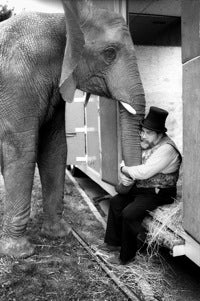
Understand, this is a selective sample that only scratches the surface, and in the vast majority of cases it’s based on things I’ve heard rather than on actually seeing the movies. (I’ll be down there myself trying to check out many of them.)
I’ve left out some of the high-profile films at the festival: Closing-day attraction “Despicable Me” is a major studio release that’ll soon be on billboards all over town, while the opening-night film, Lisa Cholodenko’s “The Kids Are All Right” (which I hear is wonderful) is sold out.
And you certainly don’t need me to tell you about the “festival adjacent” premiere of “The Twilight Saga: Eclipse”; you’re either really interested in it, or you’re really not interested it.
(Note: the full schedule, and ticket information, is available at LAFilmFest.com.
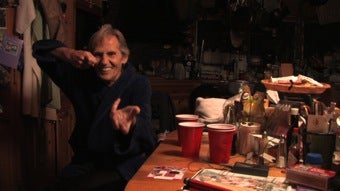 “Ain’t In It for My Health: A Film About Levon Helm” (right)
“Ain’t In It for My Health: A Film About Levon Helm” (right)
Back when Martin Scorsese made “The Last Waltz” in 1976, the Band’s songwriter, Robbie Robertson, talked lots about how the road had been the death of that great American rock group. But the Band’s drummer, Levon Helm, never stopped playing or touring, despite drugs and bankruptcy and throat cancer. Director Jacob Hatley offers an intimate (and to my mind, essential) portrait of the best singing drummer in rock ‘n’ roll history.
“Animal Kingdom”
A tough Australian drama about petty crooks, vicious thugs and a teen who has to negotiate his way through the criminals in his family and the cops on his tail, David Michod’s spare, dark film moves to a deliberate pace and continuously rachets up the tension. Most of the violence is not explicit, but the film is definitely not for the faint-of-heart.
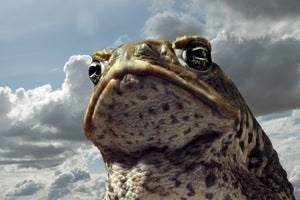 “Cane Toads: The Conquest” (left)
“Cane Toads: The Conquest” (left)
Worried about beetles threatening their sugar crop, Australian farmers imported cane toads in the 1930s. Oops. A billion and a half toads later, Mark Lewis has followed his 1988 short film with what is reportedly an irreverent, unhinged, tongue-in-cheek look at environmental catastrophe – in 3D, no less. This one looks like a hoot and a half.
“Cyrus”
The Duplass Brothers move from mumblecore to semi-mainstream – or, at least, they recruit a batch of mainstream actors (Jonah Hill, John C. Reilly, Marisa Tomei) for an Oedipal comedy that looks as creepy as it is amusing. A “freakishly engrossing black comedy,” says the Village Voice.
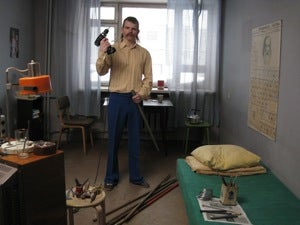 “Disco and Atomic War” (right)
“Disco and Atomic War” (right)
This one is a favorite of the festival’s artistic director, longtime critic David Ansen, and a tale of cultural revolution via bad TV. For Estonians growing up in the Soviet era, the West was represented by the likes of “Knight Rider” and disco music, and the ways in which young citizens get around the government’s attempts to block those “subversive” influences forms the basis for what is reportedly a fast-paced, tongue-in-cheek doc.
“The Driver”
The festival takes place in downtown Los Angeles this year, so why not celebrate the location with one of Walter Hill’s toughest, sharpest and bravest films? Hill’s 1978 gritty, stylized drama about a getway driver (Ryan O’Neal) and the cop who wants to bring him down (Bruce Dern) is, says Dave Kehr, Howard Hawks meets Robert Bresson meets Jean-Pierre Melville – and if that isn’t just the ticket for a downtown film fest, what is?
“The Hand in the Trap”
A spotlight feature in this year’s festival is the series of four films from Argentinian director Leopoldo Torre Nilsson, once considered a giant of international cinema and now largely forgotten. All four of his films, made between 1957 and 1973 and unseen for decades, are no doubt worth exploring; for a sampling of what Martin Scorsese calls Torre Nillson’s “uniquely claustrophobic and disquieting cinema,” I’ll go with this 1961 Cannes winner about obsession and repression.
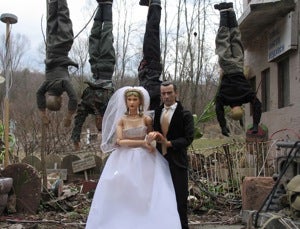 “Marwencol” (left)
“Marwencol” (left)
Jeff Malmberg has already won awards at the South by Southwest and Seattle festivals for this sensitive documentary, which follows an upstate New Yorker who tries to recover from a vicious beating by retreating from reality and recreating a World War II Belgian village in his back yard, populating it with dolls who act out a story in which good triumphs over evil.
“One Lucky Elephant” (photo at top)
“Toy Story 3” is about what happens when it’s time to put away your toys; here’s a documentary about what happens when it’s time to put away your elephant. Lisa Leeman’s film follows the bond between Flora, an African elephant, and her trainer of 17 years, who must find her a new home when the elephant retires from her circus life. The June 19 premiere screening will be followed by a panel discussion moderated by New York Times journalist Charles Siebert.
“Revolucion”
Made on the centenary of the Mexican revolution, the film is an aggregation of short films from 10 young Mexican directors, including Rodrigo Garcia, Mariana Chenillo and actors Gael Garcia Bernal and Diego Luna. I hear it’s uneven (what omnibus film isn’t?), but with a real cumulative power.
“Thunder Soul”
Last year, a raucous LAFF screening of “Anvil!” at the John Anson Ford Amphitheater, followed by a performance by the band, launched a new theatrical strategy for that hit documentary. This year, viewers may get a similar charge out of Mark Landsman’s doc about a groundbreaking high school funk band from the ‘70s, which will be followed by a reunion of the musicians all these years later.
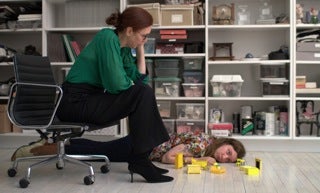 “Tiny Furniture” (right)
“Tiny Furniture” (right)
The easy take on writer/director/actress Lena Dunham is that she’s a female indie version of Woody Allen, an auteur of urban neurosis. But I get the sense that Dunham’s film rises above what LAFF’s artistic director David Ansen dismisses as “the murky middle” of navel-gazing indies. “I’m not sure I’ve seen a film … so accurately and unblinkingly depict what it’s like to feel unattractive,” wrote Karina Longworth.
“Waiting for ‘Superman’”
David Guggenheim is the guy who really won the Oscar that people think went to Al Gore for “An Inconvenient Truth”; his follow-up takes on America’s public education system, with reportedly devastating (and emotionally shattering) results.
And since it feels awful to leave so much out, here are some of the others I’m interested in seeing: the documentaries “The Tillman Story,” “Freakonomics,” “Make Believe,” “The Peddler,” “The Red Chapel,” “Secrets of the Tribe” and “The Two Escobars.”
Also: the dramas “Mahler on the Couch,” “Four Lions,” “Golden Slumber,” “Street Days,” “Cold Weather,” “Monsters” and “Hello Lonesome.”
And: the restored version of Visconti’s “Il Gattopardo,” the 1913 silent film “The Life of Richard Wagner” (playing at REDCAT as a performance of Wagner’s “Die Walkure” takes place across the street at the L.A. Opera), and the 25th anniversary screening of “Desperately Seeking Susan.”
And one more: “Utopia in Four Movements,” which sounds completely impossible to classify.
